Not Kara Danvers—the show.
Supergirl is something you hear mentioned a lot around here, and that’s because from the get-go, it has blown many of us away with its unbridled enthusiasm and positive takeaways. While there have been stumbles here and there, Kara’s optimism and staunch refusal to be infantilized, along with a rich cast of supporting characters each battling their own demons, more than earned its top spot on our “best of 2016” list.
It’s therefore with the utmost love and respect that we, Gretchen and Kylie (‘Grylie’ of course), have to discuss a problem with Supergirl’s second season. A major problem, in fact. One that is actively dragging the narrative down and undercutting the show’s otherwise feminist messaging. We’ll give you three guesses who we’re talking about (though you probably only need one). That’s right, this guy:
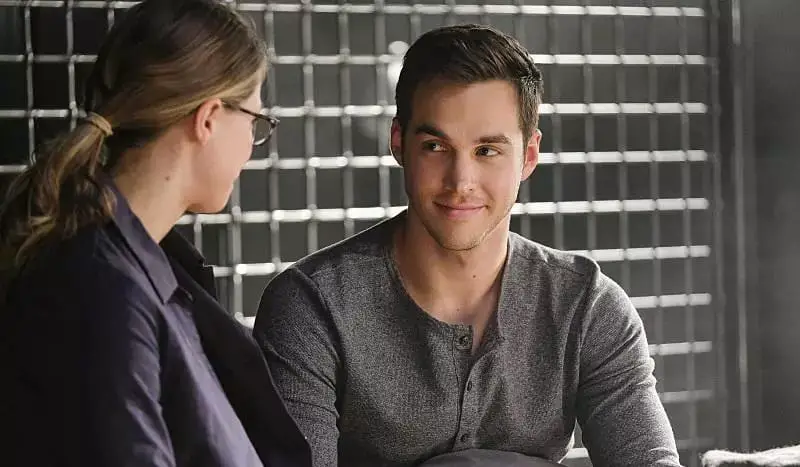
Meet Mon-El. He’s Kara’s season 2 love interest/recently-turned-boyfriend from the Kryptonian colony of Daxam, the Zeta Beta Tau of the (potentially) Andromeda galaxy. And to be clear, we weren’t opposed to the idea of him at the beginning. In fact, we saw a lot of exciting potential in another alien survivor with superpowers on the show, especially since it put Kara in the role she had always intended to fill with Clark, yet never got the opportunity.
Here’s the story of a man named Mon-El
Like his Kryptonian pod, Mon-El landed in Supergirl with a lot of hype, but without making a huge impact. (He was unconscious during the first two episodes of this season.) Kara almost immediately recognized both his planet of origin (Daxam) and that he was someone of prominence. The Hatfields and McCoys-esque planetary rivalry between Daxam and Krypton set Kara up to challenge her own prejudice.
As befits our girl of steel, once she got over her knee-jerk reaction, she urged Mon-El to use his superpowers to help people. But, for the first few episodes he appeared in, Mon-El wanted to party, lay low, and be generally lazy and privileged. He seemed poised for a ‘learn how to be a hero’ arc with Kara as his mentor, while serving as a potentially interesting foil for The Guardian, a human with no powers who had chosen to keep his own superheroing a secret rather than work as part of a team.
Mon-El’s hesitation made a certain amount of sense early on. He’s the prince of a privileged culture that still uses slaves. He probably hasn’t worked a ‘real job’ in his life, at least by Earth standards. Plus, laying low on a new planet with a foreign culture after realizing you suddenly have increased physical power isn’t a bad idea. He needed to get his feet under him. And depending on what kind of relationship he had with his parents (who are actively looking for him across the galaxy while he lies about being related to them), he may have wanted to keep a low profile. Fair enough.
He also comes from a culture with a lot of baggage, specifically baggage about male privilege and men’s relationship to women. In 2×05, he pawns his work off on Miss Tessmacher and, when confronted by Kara, claims he did so because: “She wanted to please me. On Daxam, when a woman wishes to please a man—”. Yikes. We’ve never been more grateful for Kara interrupting someone.
He also seems to believe altruism (and/or job satisfaction?) = selfishness based on how he responds to Kara’s desire to help people.
“Okay, I may have your powers but I don’t have this, this innate desire to go leaping into trouble. But that doesn’t make me a bad person, all right? You’re no saint, Kara Zor-El! You fly around, rescuing people like you’re just pure of heart. But that is crap. Because you love that attention. You love people loving you. You are not selfless. And you’re no hero.”
Mon-El further projects his own desire to stay out of trouble and the limelight onto her. He encourages her not to be a hero or go ‘looking for trouble’ because he wants to stay ‘safe’ and not get involved. To him, his survival is no more than luck and merits no reflection or compassionate reflex. His privilege gave him a simplistic approach to life, and he prioritizes personal physical safety. Beyond that, he’s content to uphold the status quo, party on, and skip work whenever he feels like it.
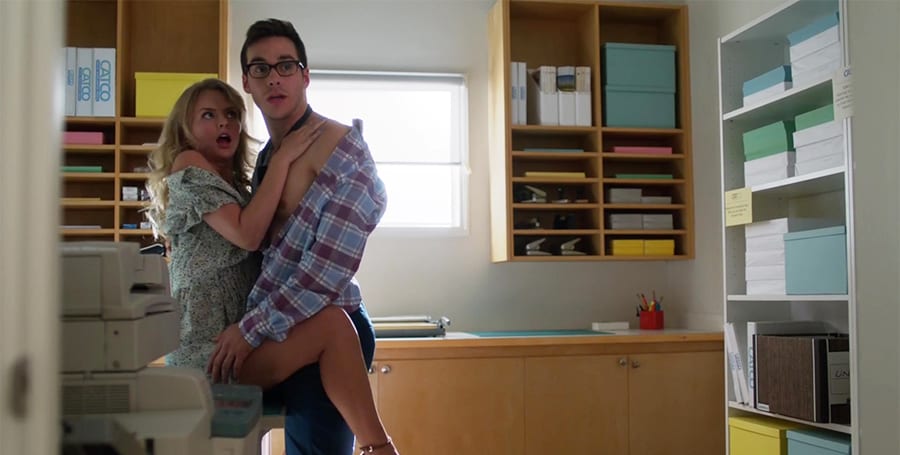
This is a problematic head-space to live in, no question. He’s privileged, entitled, selfish, pleasure-oriented to the detriment of others, and interprets kindness and compassion as acts of self-centeredness. That’s a heck of a lot of societal baggage to unlearn, and it makes sense that he wasn’t ready to jump into being a superhero thirty seconds after he lands on Earth. We appreciate that this gave Kara a chance to face down the way she projected her urge to mentor onto him without taking his desires into account. She gets a chance to apologize and back off, like the respectful person she is. After this, the tone quickly shifted from mentorship to one of potential romance.
But before we dive into that, it’s worth taking a look at his arc as it’s been set up thus far. He’s a privileged white male from a toxic culture with a need to reform his toxic mindset. His arc is ‘douchebag becomes a decent guy’, to put it crassly. Which is…fine, we guess? It’s not a bad story to tell, even if pretty stale at this point. But this season already has an arc concerned with breaking the cycle of violence, overcoming an ingrained toxic environment, and shedding problematic cultural frameworks: M’gann.
If you count Lena’s arc pushing away from her family’s villainy to become her own hero, we actually have two. This is on top of Kara’s ongoing exploration of her own mixed Kryptonian heritage and Alex learning how to make space for herself within a much more positive, but still constrained, familial dynamic. The hints we’ve gotten of Maggie’s backstory seem to imply a similarly troubled family history. We could even include J’onn learning to forgive M’gann and let go of his (very understandable) hatred for his persecutors. Heck, the main plot of the season revolves around an organization that seeks to legalize and enact bigotry and violence against refugees. It’s safe to say that the ‘overcoming toxic ideas about others’ arc is well covered this season.
With that in mind, we feel compelled to ask exactly what Mon-El contributes to this narrative that is not otherwise dealt with by any of the other arcs that touch on this same topic. His own arc does specifically involve sexism and entitlement, but is that enough to justify his inclusion, especially when this aspect gets buried under his role as Kara’s love interest?
And it does get buried. Mon-El’s character development does not follow a linear trajectory once his role shifts from potential mentee to potential love interest. Prior to him canonically expressing romantic interest in Kara (which happens in 2×07), the most negative thing one could say about him was that he was a selfish douchebag, which honestly made sense due to Daxam’s toxic culture.
It’s only after he expresses interest in Kara that the most troubling aspects of his personality manifest: his protective paternalism and repeated failures to listen to or respect Kara’s agency. Episodes 9, 10, 13, and 14 all include at least one example of Kara giving Mon-El point-blank instructions that he just as pointedly ignores. Usually because he believes he knows better than her about what the best thing to do is.

Whether Supergirl intended his behavior to be read as a result of his upbringing is almost beside the point. Canonically, it’s because he likes her. It’s right there in black and white. He blames being an jerk on his feelings for her.
“I also wanted to say I’m sorry. For acting like an *ss. I’ve been giving it a lot of thought and I have realized that you are my Kryptonite…I mean, my feelings for you. I’ve never felt like this about anyone in my life… I didn’t know that there were this many feelings to even be had. My emotions, I guess they made me kind of crazy.”
How does this explanation make his behavior any better? If anything, it’s worse because it reads as an attempt to romanticize a lack of basic respect for Kara as an individual.
Kara Who?
Speaking of Kara as an individual, there’s a reason why we’ve started off talking about Mon-El’s place in this arc instead of hers. As unhealthy as we find Mon-El’s behavior, he at least has a canonical reason for his interest in Kara. Although he questions her superheroing, he admires it too, and wants to be like her. Though the resulting narrative does look uncomfortably like he only wants to be a hero so he can get in her pants.
But while we’re not thrilled about that, it’s at least a reason that we know exists. Kara? We spent almost half an hour just trying to discern that she likes Mon-El, apart from Alex basically telling her she does.
Seriously. Kara evinces zero perceptible interest in Mon-El prior to 2×12. Kara rejects the very idea that he likes her when Eliza brings it up in 2×08. When he confesses his feelings for her in 2×10, she fails to deny his statement that she doesn’t feel the same way about him (not that she can get a word in edgewise with Mon-El talking at and over her). 2×11 opens with her admitting they’re not a good match and she would never date him.
Kara: And even if I did have time to date someone, I wouldn’t date someone like… Someone who is…
Mon-El: An intergalactic bartender?
Kara: Yes! No. It’s… Because it’s not your job. It’s… It’s the way you are.
“It’s the way you are.” This is what she spit out without thinking, too. How much clearer can Kara be that she’s not interested in him? She basically just said, “It’s not you, oh wait it is you.” So excuse us if we’re more than a little confused when Alex tells Kara, “maybe the reason that you made such big plans with me was so that you didn’t have to think about how you actually feel about him” at the end of this very same episode.
Where is Alex even getting this from? Maybe the reason Kara wanted to spend time with Alex for her ‘Earth Birthday’ is because this is a hugely important day for Kara that she’s always celebrated with her sister? You know, the canonical reason Kara gave Alex at the beginning of the episode.
And yet, this conversation is the basis for Kara’s ‘change of heart’, or ‘realization’ if you want to put it that way, about her supposed feelings for Mon-El. She’s been absolutely clear about her lack of romantic interest in Mon-El up to this point. And no, facial expressions don’t count, though to us Melissa Bonoist came across as consistently confused at best. Just look at how awkward Kara’s physicality is with Mon-El whenever he’s in her space:
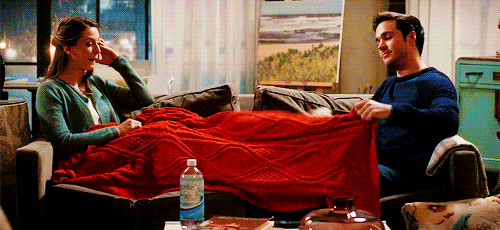
Alex’s assertion that Kara has feelings for Mon-El came completely out of the blue. Kara had only ever said she doesn’t like him that way. To go from “I don’t like you because of the way you are” (2×11) to “I thought you were thoughtless and selfish. And I kept writing you off, and you kept proving me wrong. And it just got me thinking. Maybe I can have it all.” (2×12) makes zero sense. First of all, we’d like to see the receipts for how Mon-El “kept proving me wrong”. From what we can tell, he hasn’t made consistent or lasting change since he first began exhibiting lack of respect for Kara due to his romantic interest.
Secondly, say we accept that somehow Kara is interested in Mon-El despite her never saying so until Alex throws that idea out there. Why does she like him? This is a genuine question we have, as it is nowhere stated in canon other than what Kara says to Mon-El about how he “proves her wrong.” Contrast this with the repeated explanations of and emphasis on her feelings for James Olsen last season.
The most likely possibility we came up with is that she’s attaching herself to Mon-El out of a fear of abandonment. Alex dropped the truth bomb on Kara in 2×02 that Clark abandoned her with the Danvers family, and she’s been resisting that truth ever since. The additional truth about her father’s experimentation with bio-weapons (2×08) only heightened her sense of isolation from her heritage and family.
Plus, Kara’s arc this season has been increasingly focused on her isolation from her friends. James has the Guardian and Winn, Winn has Lyra and the Guardian, Alex has Maggie, J’onn has M’gann. Visually, the frequent shots of Kara alone on screen juxtaposed with characters like Alex being comforted by others cannot be an accident.
But if this is the case, why do we not see this dealt with more specifically? Are we just supposed to assume her desire to date Mon-El stems from her fear of abandonment? Or from her trying to establish a connection with someone, though without any specific statement to that effect? And if so, why have Alex of all people be the one to tell Kara how she really feels? Alex’s relationship with Maggie makes up a significant part of Kara’s isolation arc. Alex has been spending most of the time with her new girlfriend, so where does this sudden insight into Kara’s unspoken interest in Mon-El come from? It almost felt like Alex just wanted that needy, single sister of hers off her hands. Or like she had read the script and knew Kara was going to date Mon-El.
Are we meant to see a misplaced attraction for Clark? This started off as kind of a joke between us, but the longer we thought about it, the more sense it began to make (this is how desperate we are for an explanation, guys). More than once, the narrative draws explicit parallels between Mon-El and Superman; even Mxyzptlk dresses himself up in a parody of Clark’s superman costume when he tries to prove himself a suitable hero partner to Kara. There’s no denying that Kara’s mentorship of Mon-El is the exact dynamic she never got to have with Clark, and that missed opportunity is something we’ve seen her struggle with before.
Also, Kara’s first instinct for a day job for Mon-El is as an intern at CatCo, complete with Clark Kent glasses and journalist outfit. So…does she secretly want to date her cousin? It’s weird to think about and definitely not what the writers intended, but at least it’s *some* kind of reason.
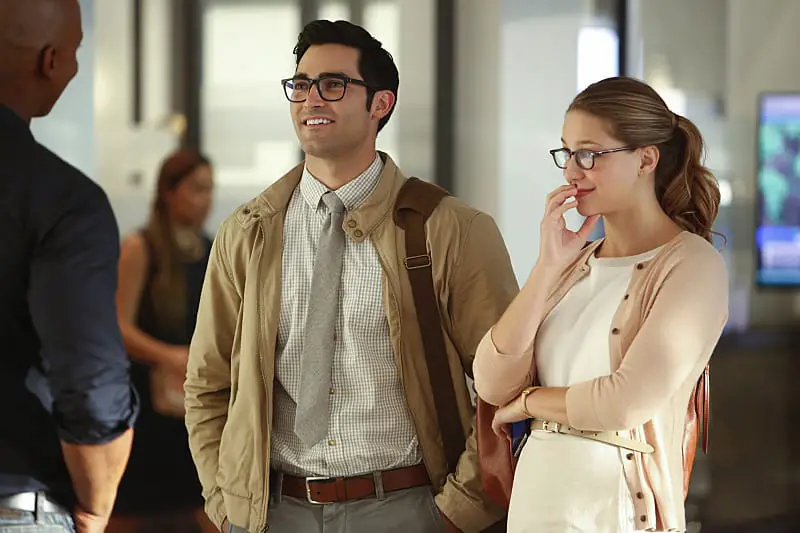
But this wild train of thought brought up an actual issue in Mon-El’s arc: the conflation of hero-ready with boyfriend-ready. The narrative especially conflates Mon-El’s desire to be a superhero with his desire to be Kara’s boyfriend on his side. He only makes the decision to try and become a superhero after realizing he wants to date Kara, and specifically right after seeing her get tazed to protect humans. Because he needs to see her physically suffering to kickstart his hero arc. It’s two clicks away from manpain, really.
On Kara’s side, she perceives Mon-El as being a compatible boyfriend when he begins to progress in his desire to be a hero. It’s not a bad reason to want to date somebody, but not a overly compelling one either, especially given how limited that progress was. Actually, what was his progress? He finds a job that’s a better fit? He improves in their sparring sessions?
It’s particularly strange since at the same time Kara is training Mon-El to be a good boyfriend hero, James Olsen is toiling away in the background as The Guardian completely of his own volition. If all Kara wants is someone to partner with her in her superheroing, the boyfriend she had at the beginning of the season already fit that criteria. And she didn’t have to drag him along kicking and whining either. Granted, James is much squishier, being a human instead of a superpowered alien. Unlike Mon-El, James is physically vulnerable and could get hurt, and not just from the bad guys. Kara can punch a car without flinching; dating a human being would come with potential hazards for them if she got too…amorous.
Which is actually a point in Mon-El’s favor. She can sleep with him without danger of hurting him. Unlike Adam or James, Kara need not worry about her powers injuring Mon-El because he’s almost as powerful as she is. We’d actually buy just this if that’s what we got on screen. Kara’s got physical needs. If all she wanted was a sex buddy she didn’t need to worry about breaking, we’d support her. You get it girl.
But at the end of the day, that’s no more than a honeypot, albeit a reasonable one. After talking around in circles for almost two hours (or was it three?), we had to finally admit that as much as any of these might make some sense, none of these explanations made it onto our screen. And most required us to ignore multiple scenes that’d work against them.
The fact is, in between Kara telling Mon-El she doesn’t want to date him and her telling him she wants to make it work, only two things happen: 1) Alex tells her she likes Mon-El, and 2) Kara learns Mon-El has been drinking club soda lately.
As absurd as that sounds, the scene in 2×11 where she discusses club soda with M’gann is the only physical flash of potential interest from Kara in basically the whole season. She’s sitting at the bar when M’gann comes by and asks her what she wants to drink. Kara tells her she’ll drink what Mon-El is drinking, to which M’gann replies, “he’s been drinking exclusively club soda for the week.” Kara’s “Really?” reads as both surprise and, weirdly, interest. We say “weirdly” because why the heck would his drinking choices make any difference in how she feels about him?

We suppose it could be an attempt to address his frat boy culture and drinking issues. Club soda is the go-to for non-drinkers at a bar. But Mon-El’s drinking has never been a canonical reason for Kara’s lack of interest. She cites their cultural differences frequently, but never specifically calls him out for his drinking. So why would a change in that behavior specifically trigger a positive response from her? Is it just meant to be a sign that he’s shaping up in a more general sense? If so, Supergirl dropped the ball, since this hasn’t manifested in any other way for Mon-El. Not to mention he’s enjoying a margarita in 2×14 and was more than happy to provide a stressed Winn with a drink in 2×15 since, “Zakarian Ale always takes the edge off.”
Point being, it’s simply impossible to connect M’gann’s line to any sort of growth in Mon-El, even just related to his alcohol consumption. So does Kara really just want to date a dude who drinks club soda too? We suppose those wholesale prices can’t be beat.
Crack theory though it be, it makes more sense than Kara’s explanation that “Every time I put myself out there, it backfires” (2×11). Uh. Footage not found, Kara Danvers. As we recall, you did the breaking up with your two canonical love interests because you wanted to focus on your career and thought you’d be better as friends. Unless maybe it backfired when Adam and James ordered tonic, because she wanted to split a bottle.
We’ll stop.
Seriously though. We understand that relationships can make you feel vulnerable. Putting yourself out there can be hard if you’re afraid it won’t work out. But Kara has never actually given a relationship a chance to get further than first date and first kiss (until now). Her lived experience, as depicted on the show, does not merit the explanation that every relationship “backfires.”
All we’re left with at this point is that Kara likes Mon-El…because Alex tells her she does.
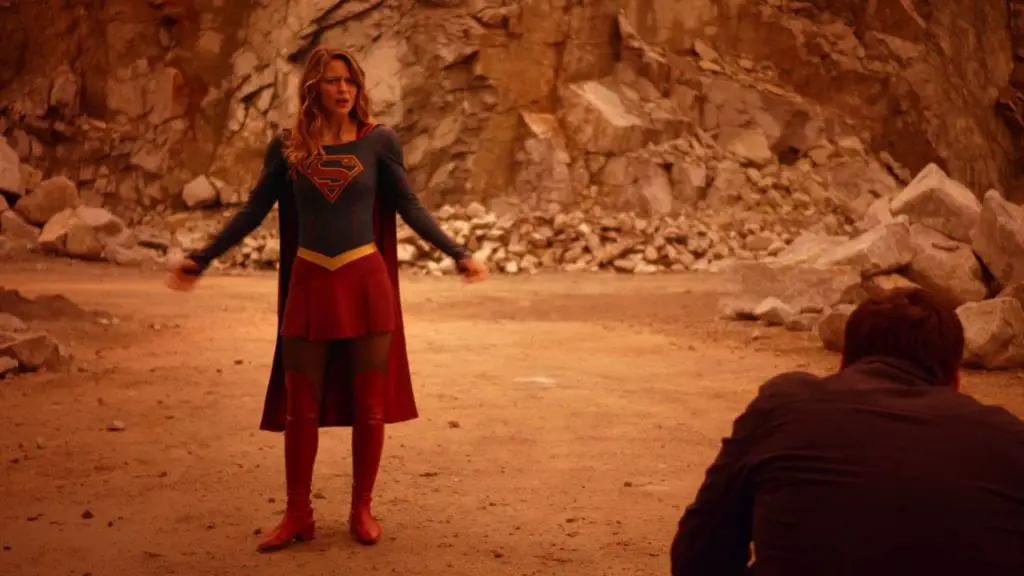
Mon-El who?
It ought to be clear at this point that the writers seem to have invested far more energy into giving Mon-El a backstory to explain his general douchebaggery than they did in giving Kara a reason to even be interested in him. He was shoehorned into her arc to the point where there is no canonical explanation for her interest in him, because her agency didn’t matter as much as him learning how to be a decent human being. She’s became little more than a love interest in her own story.
We might mind this less (though only slightly) were it an actual adaptation of the source material. But Mon-El in the comics has nothing in common with the Mon-El on our screens. We don’t have time to go into details, but you can look it up yourself if you want to understand the various permutations of this character over the years. To be brief, Daxam in the comics is not a misogynistic, slave-holding race of frat boys and privileged partiers. They’re xenophobic and tend toward isolationism, sure, but that’s about it. Mon-El is not the heir to a sexist, toxic culture who learns how to be a decent guy and caring romantic partner in the comics. He’s basically just Superman 2.0.
In short, this is not an adaptation. Mon-El was a blank slate that the Supergirl writers did what they wanted to with, simply using a familiar name to establish him. (Even though the whole “El” thing kind of makes no sense in this context.) To be fair, it’s not the first time they’ve done this. But it does mean that there’s no justification for Mon-El’s arc this season, romantic or otherwise, other than “this is the story they wanted to tell.”
And we actually know they wanted to tell this story and tell it this way. In an interview with Chris Wood (who plays Mon-El) for Sci Fi Magazine’s April 2017 issue, Wood describes how the showrunners wanted Mon-El to have a hero’s journey, and “a good starting point for [Mon-El] is something that is the opposite of a full hero, which is a frat boy and selfish and self-centered.” The rest of the screen shots of the interview make it pretty clear that Mon-El’s arc from frat boy to hero was intentional from the beginning.
What’s more troubling are Wood’s comments regarding how the mentorship and romance aspects of the arc complicate the characters and give Kara “a lot to react to.” Troubling because Wood does not seem to realize how much Mon-El has not just taken up screen time in but taken over Kara’s arc. And ‘complicated’ might be true, but we have other choice words to describe what intertwining the mentorship and romance arcs has done to Kara’s story this season…
So he’s a bit of a fixer-upper
Just to recap here: We have a completely original character that has cannibalized screentime to the point where the series protagonist and titular character doesn’t have much of a discernible arc, and did so through a series of contrivances that have no possible Watsonian explanation outside of a shared Schweppes predilection. And yes, we have to point out that it’s a female lead getting the shaft in favor of this new male character. Though there are more women-led TV shows now than ever, we are not at a point where representation is good enough for this to be ignored.
As we said, we did see potential in Kara being able to fulfill the mentor role she was meant to with Kal-El. The chance to explore Mon-El’s shared trauma with Kara over the destruction of their planets could have been incredibly poignant for both characters, especially if explored alongside the unpacking of Mon-El’s toxic culture.
Further, M’gann’s storyline showed us how breaking through cultural conditioning and the cycle of violence can be incredibly moving and impactful. Given Daxam’s description, Mon-El pushing against his own culture would have inherently required a white male character to come to terms with his own privilege—a potentially powerful story in today’s cultural context. Honestly, the way Daxamites are portrayed is so over the top that Mon-El ran the risk of being a kind of misogynistic strawman for Kara to rip into, which could have easily felt too pandering or heavy-handed. It would have been understandable in Cat’s absence, who was rather famous for dismantling sexist ideas with her long speeches, but we can’t say we’re upset that didn’t happen.
Yet what did happen, as we said, was that the Supergirl writers decided to use Mon-El’s romantic interest in Kara as a catalyst to spur his growth. Similarly, Kara’s romantic interest in Mon-El at least somewhat fueled her desire to mold him into a superhero. The thing is (as Mr. Mxyzptlk of all people pointed out): this didn’t really happen. Instead, given Mon-El’s previous bad behavior, his newer displays of basic decency and minimal competence were framed as acceptable romantic behavior in a partner, and good enough for Kara.
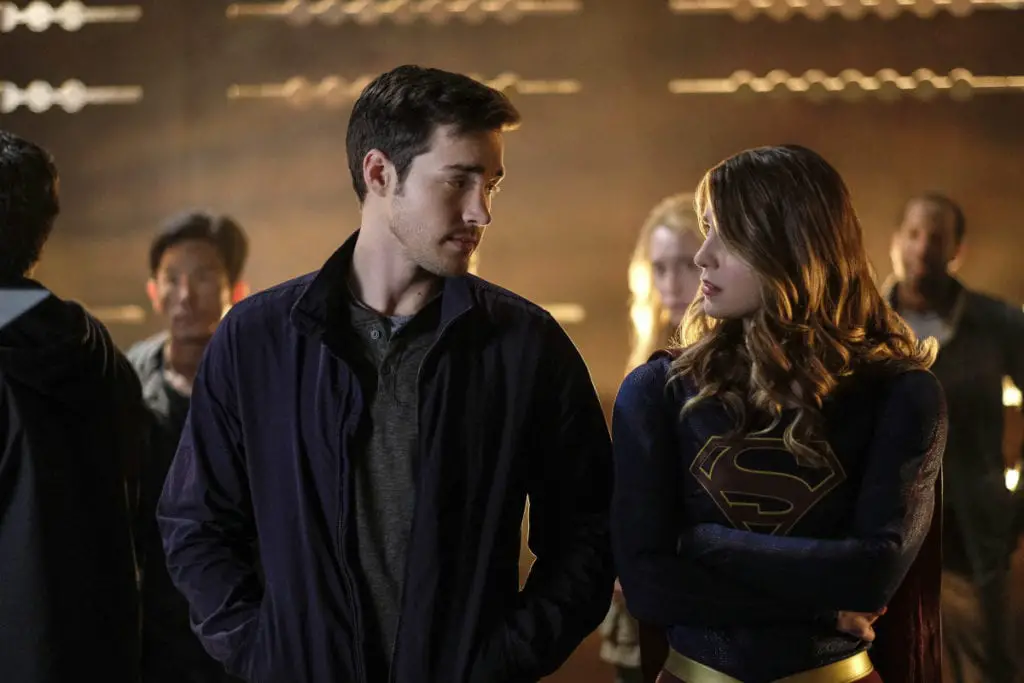
This is why we keep joking about club soda. Even if it was just showing Mon-El’s increased capacity for responsibility, all it really meant was that he managed not to get drunk on the job for a week. That’s it? That’s the bar he needs to clear?
The answer is “yes” because at its core, this is the “fixer-upper” trope. In some ways it should be the 101 example of the fixer-upper trope, unless we want to whip out Belle and Rumple from Once Upon a Time (though even with that, there’s so many scenes of Kara explicitly training Mon-El on how to behave that it might win out). While this does tie back to the show’s conflation of “ready-for-action superhero” and “ready-to-date”, it more closely relates into the uncomfortable gendered implication of Mon-El’s foregrounding over Kara in the first place.
The thing is, the fixer-upper trope is sexist, because it plays out in a specifically gendered way. Its employ forces women to take on a man who’s substandard in some way and put in the work to ensure he becomes a suitable romantic partner. It’s Spike and Buffy, or Marge and Homer. The only genderbent example we can think of is She’s All That, and the “fixing” Rachael Leigh Cook required was to look more sexually appealing by taking off a pair of glasses. So…kind of hard to call that a feminist masterpiece.
Relationships are work, sure. But this particular dynamic is quite evocative of the Nice Guy™ trope for a similar reason; there is a complete devaluement of a woman’s feelings and emotional needs, not to mention it leaves no space for her to have her own problems. When there’s a Nice Guy™, the woman is supposed to see his value because he’s, well, nice. That’s the bar, and it sets up the demonification of women who rejects any man that clears it.
The fixer-upper trope is similarly rooted in male entitlement to a woman’s affections, though in this case it’s even worse. The woman is required to suffer the man’s bad behavior until she can get him to understand, because the only thing that can motivate a man to change is romantic interest in a woman.

There’s just…so many issues with this line of thought, not the least of which being the compulsory heterosexuality. It’s not constructive for men to feel that they’re incapable of reform, or growth, or the ability to strive to be better people without the help of women. It’s sure as hell not constructive for women to feel that they have to put up with bs to bring about that growth. In fact, that underlying mentality is what leads to a culture where women are more likely to stay in unhealthy or even abusive relationships. If the man errs, it’s the woman’s fault for not being better at fixing him, just like a cheating man means a wife who failed to satisfy him. A woman who leaves a fixer-upper is “giving up” on the man, when her love could “save” him.
Though we could write ten thousand words on the ways this line of thought pisses us off, nothing sums it up more than an amazingly on-point speech from The L Word—an often times amazingly off-point show, especially as it has aged.
“Oh, f*ck off, Mark. It’s not my job to make you a better man and I don’t give a sh*t if I’ve made you a better man. It’s not a f*cking woman’s job to be consumed and invaded and spat out so that some f*cking man can evolve.”
Kylie shared this scene in which Jenny Schecter rips into her male roommate, who had violated her privacy and trust in a big way, with Gretchen the day after “Homecoming” aired. Apparently others made this connection to Mon-El as well, enough so that it resonated with over 13,000 people and counting. Because while we concede Mon-El needs fixing due to his cultural baggage, why is it Kara’s job to “fix” Mon-El and not, you know, his own? And why is this being so prioritized in the season’s narrative?
If this were simply in the context of Kara molding Mon-El into a superhero, that would be one thing, but again, the fact that he becomes her boyfriend adds layers to our discomfort. We were treated to multiple scenes of him not listening to her, or flat out undermining her, and yet she still makes the decision to enter into this relationship.
What’s worse is that Mon-El, though not the world’s greatest action hero, didn’t start ignoring what Kara was telling him until after he made it clear in a conversation with Winn and James that he wanted to pursue her romantically. Like we said, he already needed fixing given his inherent entitled approach to life as a Daxamite, but is this how they demonstrate romantic interest? With scene after scene of him refusing to listen to her, the woman he is supposed to care for?
Just as a refresher…
- Kara tells Mon-El to buzz off; he pesters her instead (2×09)
- Kara tells Mon-El to ‘keep his mouth shut’ when they meet up at Catco; he immediately starts talking in the elevator (2×09)
- Kara tells Mon-El to go get the DEO for help; he follows her through the portal without contacting the DEO (2×09)
- Kara tells Mon-El to protect the cops and let her tackle Livewire’s henchmen; he abandons the cops and they would have died if Guardian hadn’t shown up (2×10)
- Kara tells Mon-El to let her handle Mxy; he challenges Mxy to a duel to the death instead (2×13)
- Kara tells Mon-El not to tell the DEO they’re dating; he does after about three seconds (2×14)
- Kara tells Mon-El to be give her dad the benefit of the doubt and get to know him; he instead makes rude remarks at the family dinner (2×14).
- In response to ^, Kara demands that Mon-El stop and say something nice; he continues to confront and accuse Jeremiah (2×14).
- Kara tells Mon-El he needs to learn that what she says matters; he goes to get advice from a male colleague instead of listening to her (2×14)
And okay, let’s say that yes, this is how Daxamites are conditioned to behave in a relationship. But it’s sure as hell not how Kara is. Fixer-upper tropes are terrible, but at least the problems are usually fixed or the issues are subsiding before the woman dates him! Instead, Kara is more or less plunked into this relationship where her needs are dismissed, which is the opposite of shocking since his actions prior to them dating fell into this pattern too. It’s also worth mentioning that she calls him an “arrogant dudebro” four seconds before she goes to kiss him for the first time. Well, first time where neither of them are on drugs. So she is aware of these issues, and seems to want to date him in spite of that.
This is one of our biggest struggles, as you could probably tell, while we searched for some explanation to explain Kara’s interest. At the end of the day, what is it that they’re going for here?
If the Supergirl writers truly believe Mon-El has grown as a result of all his time with Kara, they’re going about showing that growth in an incredibly unusual way. In “Homecoming” (2×14), the first episode where Kara and Mon-El operate as an official couple, Mon-El is more or less at his worst. Heck, he ignores her request for privacy so quickly that it’s framed as a joke in a jump-cut. It actually seems like it’s supposed to be endearing, just like when that gosh darn rascal followed Kara through the portal and jeopardized both their lives.
Given the number of times this happens, Kara willingly entering into a relationship with him is not the most comfortable thing in the world, especially since she realizes when he’s not respecting her and tends to yell at him for it. Her acknowledgement, and we guess dismissal, of his issues are often evocative of a battered girlfriend. We’re not saying that’s what this is. But what we are saying is that as women, each time we watch Mon-El promise to change and Kara forgive him, only for there to be zero lasting impact, it’s a dynamic we’ve seen before. And it’s a dynamic that lessens the impact of Kara standing up for herself each subsequent time, since she looks more and more like a fool for believing it and him.

This is just…bad. There’s no other word for it.
“Homecoming” is by far the worst offender of the season, especially since the narrative exonerates Mon-El in the end for his dismissal of Kara’s emotional needs. He was right about Jeremiah being compromised, and shame on everyone else, including an actual mind-reader, for not seeing it! Then, the final scene of that episode was supposed to demonstrate that Mon-El is a supportive boyfriend because of his willingness to listen to Kara. What’s weird is that this was framed as this huge, momentous thing that he was doing, to the point where it required his narration to confirm that yes, he is going to extend Kara this very basic sign of respect.
“Hey, today was a, a little, I just want to (*sighs*) I’m not I’m not gonna talk. Hmm. Why don’t you…Why don’t you tell me what you need? I’ll listen.”
She is sitting, sobbing on a couch. After her father betrayed her whole family and the DEO. This is not a difficult situation to parse out. Why did we need to hear him pontificate on how he’s willing to listen while she has to provide a PowerPoint presentation on the basics of comforting someone?
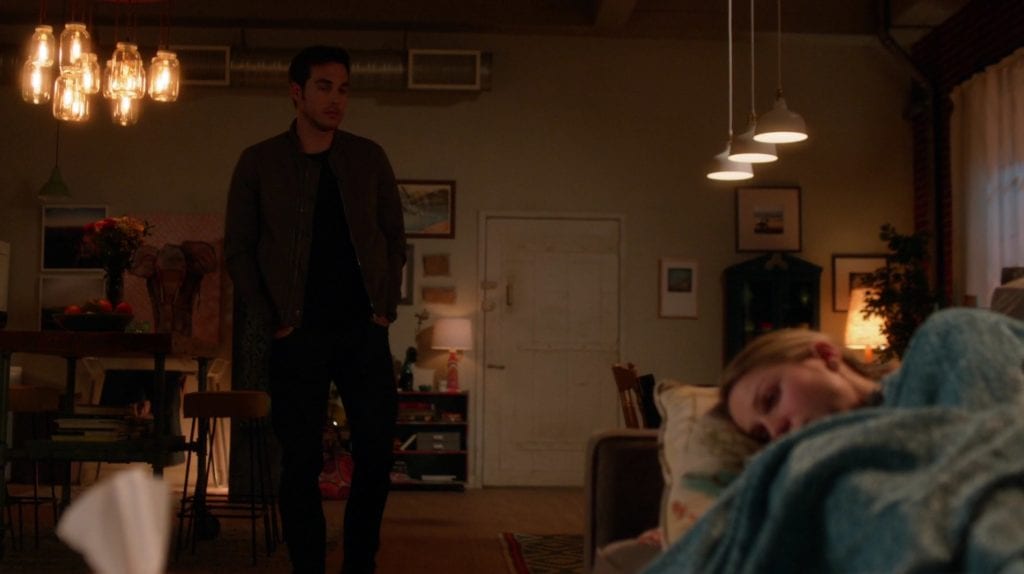
We’re left simply dumbfounded. Were we supposed to find his line romantic? Coming right on the heels of a scene where Maggie instinctively supported Alex in the way she required with no hesitation? Especially given that despite Kara asserting her need for him to listen to her in very certain terms, he still had to seek out the advice of Winn because he felt he didn’t know what to do? All this scene showed us was that Mon-El needs to be hand-held and validated through the most basic attempts at emotional intimacy with his girlfriend. Wow, what a winner. Sign us up.
It’s been pointed out that in the most recent episode, he seems much more supportive of Kara, responding to her confusion regarding whether or not to post the article on Cadmus with a “do whatever you think is best.” It’s nice he supports her, but could he maybe, we don’t know, ask her what she’s feeling conflicted about? Talk her through her decision-making process? Be a sounding board for pros and cons? Yes, his penchant for undermining and questioning Kara’s decisions troubled us, and we do appreciate positive growth. But he’s swung so far in the other direction that he now just tries to pacify her, and is basically useless as a dialogue partner. In some ways, it’s almost patronizing. Besides, more than anything, it’s too little, too late.
The only feeling this is truly imparting on us is “why?” Why is Kara saddled with this guy? Why is she attracted to him at all? Why did there need to be a romantic component to this relationship in the first place? Why was James Olsen abruptly sidelined for this? Why has this relationship taken over Kara’s arc this season?
Dear Supergirl Writers
We have no answer to these questions, and it’s making justifying Mon-El within this season incredibly difficult. Frankly, Mon-El as a love interest is difficult to justify within this show. From what we we saw prior, it was not the type of program that would allow for these horrible implications about what kind of romantic behavior women should tolerate, or even expect.
Not to mention, Mon-El isn’t the main character here! We could keep going on about the fallacy of his hero’s arc and the horrid implications inherent, but at the end of the day, he is supposed to be a supporting character. So what the hell does his presence in Supergirl do for Kara? If this is about seeing her desire to mentor someone play out, why was the romantic component shoehorned in, and why aren’t we privy to how Kara feels about both him and her new role? Why couldn’t Kara have had this arc with James, given how he is willingly putting himself in danger, just like she wants Mon-El to do? Most importantly of all, why is Kara relegated to playing the babysitter of someone else’s mono-myth on her own show?
It’s frustrating to see this play out, it’s frustrating to see how it took the narrative off-track for a good number of episodes, and it’s frustrating to see Kara almost turned into a straw feminist that asserts her wants and expectations of Mon-El repeatedly, only for growth to be back-dialed so that she can run into the same exact issue again. Is the point that she’s supposed to learn a mediocre man really is good enough?

At this point, we’re really struggling to see how there’s going to be any sort of positive takeaway from this. Oddly, our biggest glimmer of hope came at the end of the last episode, immediately after Kara was fired from her job.
Kara: Reporting is my calling. I help people.
Mon-El: You know who else does? Supergirl.
Kara: You know, it’s just, when I write, I don’t need a yellow sun. It’s just me. Supergirl is what I can do. Kara is who I am. I really loved that job.
Mon-El: Hey. You have so much to offer this world. So don’t let Snapper or anyone else tell you differently. Okay?
Kara: You know something? Maybe being Supergirl and having you is enough.
This exchange did two things: firstly, it established that Mon-El is not very in-tune with who Kara is and what drives her—what makes her feel complete. Her struggle with identity was the beating heart of the first season, and certainly a focus at the start of this one between Clark’s appearance in National City to help her, and her decision to finally become a reporter. It’s entirely possible Mon-El was just being used to give Kara a reason to explicate this distinction to the audience, but it also could mean that the Supergirl writers are aware of the disconnect between the person Kara is and the person she’s currently chosen to be with.
We admit this is a stretch.
However, the second result of this exchange is something we cannot believe is unintentional. Kara musing that maybe being Supergirl and dating Mon-El is “enough” is meant to be challenged. It was said three seconds after she had just explained how fundamental being a reporter was to her sense of purpose, not to mention, we were treated to a scene last season where Cat tackles this exact mentality in Lucy Lane’s behavior.


Unless the entire writing staff sustained head injuries, we staunchly believe that Kara will find that her words do not ring true. Especially since Clark point blank told her that being Kara was as important as being Supergirl (2×01). She needs a human side as well as a superhero side. In a season that began with Kara professing, “Last year was all about figuring out how to be Supergirl, and now it’s time I figure out how to be Kara,” her blasé acceptance of the lack of a fulfilling career is ripe for deconstruction.
But where does that leave Mon-El and the fixer-upper trope? Well, if they’re setting up Kara to have a comeuppance about this scene, it’s possible that will play out on an even bigger level. That there is supposed to be a discomfort in watching Kara put up with so much from Mon-El over and over again, and perhaps this will be tied into her canonically established abandonment issues more explicitly than it has been thus far.
Yes, this doesn’t exactly address why the writers forced this incredibly contrived romance into being without adequate explanation or exploration from Kara’s perspective. Again, we couldn’t come up with a single reason as to why she would date this man that made sense with how everything unfolded. But it’d still be a hell of a lot better than if we’re supposed to seriously view this as an earnest, romantic love story.

Because sorry, it’s not. It is not the job of a woman to date a guy with a million red flags because she feels she can elicit change in his behavior, and it’s certainly not her job to stay to see that through when the guy continues to disappoint or fail to meet her own emotional needs. Men don’t need a woman’s love to grow or strive to become a better person; that’s offensive to men and oppressive to women. It’s for this reason that we feel the “fixer upper” trope needs to die. To see it played straight on Supergirl would be disappointing, to say the least.
But at the same time, this is Supergirl. This is the show that when it’s good, it’s *so good*. The show that has subverted a number of sexist tropes before, and no matter what we think of the follow-through so far, has given Kara the narrative space to ask to be respected and listened to by Mon-El. This is at least recognized as a need by the writers if nothing else. Mon-El has been a stumbling block, there’s no question. Any character that pulls a narrative off its track this much would be. The Supergirl writers can potentially be our heroes in the end, taking this opportunity to consciously tear down the idea that fixer-uppers are entitled to our time and efforts.
However, to do that, the writers need to realize there’s a problem. They need to see that on a show that was supposed to be about a woman becoming the hero while struggling with her sense of identity and place in the world, a man is now subbed into that role. A man with no basis in the comics, a man that the audience never asked for, and a man that is not nearly as “reformed” as they currently seem to think he is.
Mon-El is not a hero—he’s Supergirl‘s kryptonite. And the writers need to do something before he irreparably harms the show.


